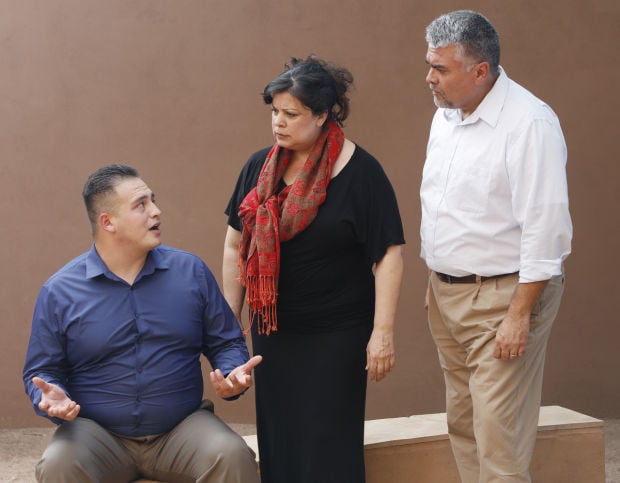When something disturbs playwright Guillermo Reyes, he often sits at his keyboard and writes.
“For me, writing feels cathartic,” Reyes says. “Dramatizing it is my way to put the tragedy in perspective.”
So it isn’t surprising that when the Jan. 8, 2011, massacre in Tucson happened, he was compelled to create.
“I had a vague idea that I could write a play about it, but I didn’t know what the focus would be,” said Reyes in a phone interview from Tempe, where he is a professor and head of New Works and Composition at Arizona State University. Then, last year, he heard Daniel Hernandez talk about his memoir, “They Call Me a Hero.” Hernandez was instrumental in saving Gabrielle Giffords’ life after the shooting that killed six people and injured 13.
“I read it very quickly and we met,” Reyes recalls. “I told him I wanted to do it as a play.”
Hernandez agreed and the result is “They Call Me a Hero,” which Borderlands Theater previews tonight and gives its world premiere on Friday.
“He let me reimagine the book in a theatrical way,” Reyes says of Hernandez. “He allowed me a lot of leeway.”
Still, the facts fed the story.
“The writer has to reimagine some things, such as dialogue,” he says. “But the responsibility (to the truth) is very high. You have to make sure you are not falsifying the spirit of the people (involved). Step by step, you have to make sure you stick with the facts. … It’s a question of not sensationalizing anything.”
Hernandez’s book was his framework. He augmented that with additional research on the shooter, Jared Lee Loughner, and Giffords. He was able to incorporate dialogue from records of law enforcement’s interviews with Loughner, his family and the Walmart clerk who sold Loughner the fateful bullets.
The play, as the book, tells the story of the shooting and its aftermath from Hernandez’s perspective.
“It’s an attempt to capture the moment in time when he was called a hero,” Reyes says. “He had some misgivings about the world. He’s trying to commemorate the event in the book as part of a civic type of enterprise where everybody was able to rise to the occasion.”
Through Hernandez’s story, issues that are important to the statewide community are addressed.
“The family — Daniel is from a bilingual family — and gun violence,” Reyes says. “Daniel’s story captures a certain zeitgeist of what’s going on in Arizona. It feels interesting to watch the drama of Arizona unfold on the stage.”





